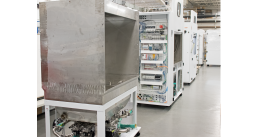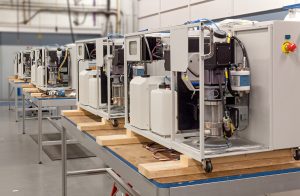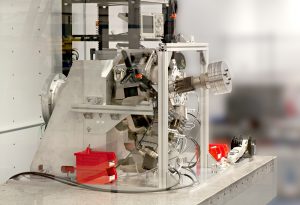Looking to outsource your high-end machinery manufacturing but not sure what kind of good contract manufacturer looks like? Contract manufacturing is still alive and well within the US if you know where to look. But what exactly should an OEM look for when outsourcing their machines or equipment within the US?
Some OEMs can afford to manufacture their product using just any local CNC machining or assembly shop. Other OEMs may require a more sophisticated contract manufacturer to manage the production of complete machinery or equipment builds according to very specific quality and regulatory standards. Industries such as defense, medical, semiconductor, and energy all have unique requirements that determine how the entire manufacturing and quality process MUST be handled.
To adapt to these exceptional needs, a great contract manufacturer will have a series of robust quality systems in place–while also continually striving towards operational improvements internally–to manage any unique requirements set forth by the OEM, as the customers’ products flow through each stage within the manufacturing process.
If you decide to outsource your low-volume, high-complexity products, and assemblies, here are some things you’ll see in a high-end contract manufacturer:
1. A Highly Trained Workforce
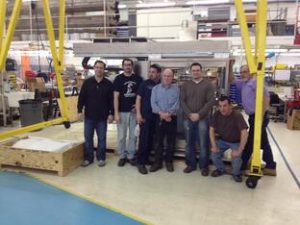
It is imperative to remember that manufacturing companies within the US have taken a difficult hit over the past 20 years. However, there is an enormous advantage for OEMs that partner with contract manufacturers consisting of a highly trained and nurtured workforce. The manufacturing skills needed to execute the unique needs of a high-end machinery OEM do not happen overnight and take years to cultivate.
If the contract manufacturer values its employees and has a history of training and retaining their internal labor, you can be sure that the internal labor will be ready and able to handle your project from its onset. It takes a long time to train and hone the skills of high-end machinery manufacturing personnel. Unfortunately, this may be difficult to see when on a tour of the facility but will be immediately felt when the manufacturing tasks become “tough.” A supplier that is prepared and has invested in its employees is a supplier that will be successful.
2. Continuous Improvement
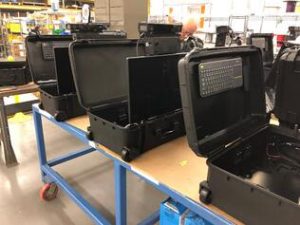
If you’re looking to outsource your high-end machinery to a contract manufacturer, then you’ll need the reassurance that your product will be produced as efficiently as possible. A high-end machinery manufacturing company understands the value of continuous improvement efforts and takes the necessary steps to improve the efficiency and operational effectiveness of the facility and to adapt to the constantly changing needs within the industry. These improvements will positively affect the throughput and quality of the contract manufacturer.
Make sure that the contract manufacturer is incorporating lean practices, six sigma, the Theory of Constraints (TOC), and other methods which will increase both profitability and marketability for new customers. The management team should actively pursue these efforts and lead other employees to understand the benefits of implementing continuous improvement efforts in a company-wide effort.
3. Extensive In-House Capabilities
Most high-end machinery manufacturers all share a common theme: a vertically integrated business model. This is a huge difference between a true high-end contract manufacturer and a contract assembler that does complete builds.
A great high-end machinery manufacturer should have the capabilities to manufacture approximately 50% or more of the value-add within the final product. This gives the company a high level of quality control of the product. For example: if an OEM’s product is a piece of high-tech machinery or equipment, then the contract manufacturer should have capabilities in the following areas: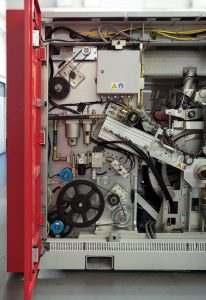
- New product introduction engineering
- Rapid prototyping
- Low-volume CNC machined parts
- Milling and turning
- Sheet metal forming
- Frame welding
- Electrical wiring
- Cleanroom assembly
- Testing and inspection
Each part is critical to the OEM’s final product and avoiding potential issues from outside vendors is a great way to avoid quality and delivery issues. Relying on outside vendors can cost a contract manufacturer their reputation and easily blow important delivery schedules.
Don’t miss out on your important deadlines as an OEM just because the machinery manufacturer you hired heavily relies on outside vendors. Be sure to ask which manufacturing services are provided in-house when touring your next contract manufacturing facility.
4. Manufacturing & Engineering Production Teams
Great contract manufacturers will have a strong employee infrastructure consisting of a smart mix of direct and indirect employees who can take on the difficult task of managing complex products through the manufacturing process. Once you’ve entered a high-end machinery manufacturing plant, you’ll be sure to see an array of teams working together to ensure that each project makes it to its completion.
The transition of turning the product from raw materials into finished goods will appear smooth and seamless. You will clearly see technicians on the floor producing parts, inspection personnel in the QA department, engineering teams for routing and optimizing the process, and finally assembly workers and supervisors ensuring that the product is assembled correctly. Look a bit deeper, and you’ll see manufacturing managers, industrial process engineers, test personnel, purchasing, and production supervisors, all acting as the glue to manage and monitor quality, delivery, and cost.
5. Quality & Process Controls
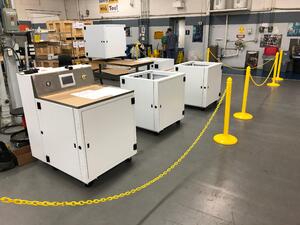
Great contract manufacturers don’t just operate by the seat of their pants. They have years of experience from which to learn and utilize their successes and failures to create new and improved systems. When looking at the landscape of contract manufacturing firms you’ll find an extremely wide range of capabilities and process controls, and then an even larger range of quality and delivery scores from their customers. These quality and process control systems help in managing new, complex, and unique programs based on the customers’ needs.
By wrapping a complex product in the arms of a robust quality system, great products will be built from the ground up repeatably and reliably. As a high-end machinery OEM, you know this type of reliable system is what sets a great contract manufacturer apart from one that is not quite yet up to par.
6. Top-Down Management Commitment
The key to a success in high-end machinery manufacturing is a management team that is 100% committed to their process and people. Visibility and KPIs are managed at the highest level to ensure each individual customer requirement is aligned with the operational capabilities. Agile program management that is empowered by their ability to move products through the facility with the manufacturing team as efficiently as possible is a very important asset.
These managers are the tactical advantage for CEOs and VPs above them, and by aligning the roles and responsibilities of these management members, communication is quick and effective. You, as the customer, will benefit from building these personalized relationships with key internal personnel.
Not all contract machinery manufacturing companies are created equally. What is the best way to know if the contract manufacturer is the best fit for your unique machinery manufacturing needs? Take a tour of their manufacturing facilities, and you’ll be sure to see the stark contrasts between a high-end machinery manufacturer and its more basic counterpart.
The list above provides a small insight into what types of things to look out for when touring these facilities. By understanding these variables and why they are important, OEMs can compare and contrast to make the right decision. They can also see why not all contract manufacturing companies are the same and what it will mean for their product at the end of the day.
By touring the facilities of a few good candidates, and using this list above, you will easily be able to differentiate which company is the best fit to handle your unique requirements and needs as a customer.
If the contract manufacturer is continually striving to improve their business, you’ll be sure to trust that the contract manufacturer of your choosing will be able to produce a product for you as efficiently, timely, and seamlessly as possible.
Once you do find the suppliers you’re interested in, use our guide to choosing a machinery and equipment contract manufacturer to help you decide on the best pick for your business. To get your downloadable guide, fill out the form below.






